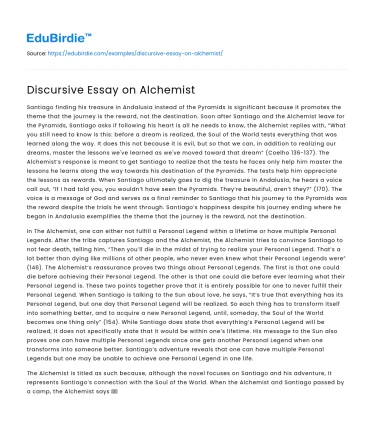Santiago finding his treasure in Andalusia instead of the Pyramids is significant because it promotes the theme that the journey is the reward, not the destination. Soon after Santiago and the Alchemist leave for the Pyramids, Santiago asks if following his heart is all he needs to know, the Alchemist replies with, “What you still need to know is this: before a dream is realized, the Soul of the World tests everything that was learned along the way. It does this not because it is evil, but so that we can, in addition to realizing our dreams, master the lessons we've learned as we've moved toward that dream” (Coelho 136-137). The Alchemist’s response is meant to get Santiago to realize that the tests he faces only help him master the lessons he learns along the way towards his destination of the Pyramids. The tests help him appreciate the lessons as rewards. When Santiago ultimately goes to dig the treasure in Andalusia, he hears a voice call out, “If I had told you, you wouldn’t have seen the Pyramids. They’re beautiful, aren’t they?” (170). The voice is a message of God and serves as a final reminder to Santiago that his journey to the Pyramids was the reward despite the trials he went through. Santiago’s happiness despite his journey ending where he began in Andalusia exemplifies the theme that the journey is the reward, not the destination.
In The Alchemist, one can either not fulfill a Personal Legend within a lifetime or have multiple Personal Legends. After the tribe captures Santiago and the Alchemist, the Alchemist tries to convince Santiago to not fear death, telling him, “Then you’ll die in the midst of trying to realize your Personal Legend. That’s a lot better than dying like millions of other people, who never even knew what their Personal Legends were” (146). The Alchemist’s reassurance proves two things about Personal Legends. The first is that one could die before achieving their Personal Legend. The other is that one could die before ever learning what their Personal Legend is. These two points together prove that it is entirely possible for one to never fulfill their Personal Legend. When Santiago is talking to the Sun about love, he says, “It’s true that everything has its Personal Legend, but one day that Personal Legend will be realized. So each thing has to transform itself into something better, and to acquire a new Personal Legend, until, someday, the Soul of the World becomes one thing only” (154). While Santiago does state that everything’s Personal Legend will be realized, it does not specifically state that it would be within one’s lifetime. His message to the Sun also proves one can have multiple Personal Legends since one gets another Personal Legend when one transforms into someone better. Santiago’s adventure reveals that one can have multiple Personal Legends but one may be unable to achieve one Personal Legend in one life.
Save your time!
We can take care of your essay
- Proper editing and formatting
- Free revision, title page, and bibliography
- Flexible prices and money-back guarantee
The Alchemist is titled as such because, although the novel focuses on Santiago and his adventure, it represents Santiago’s connection with the Soul of the World. When the Alchemist and Santiago passed by a camp, the Alchemist says “You already know about alchemy. It is about penetrating to the Soul of the World, and discovering the treasure that has been reserved for you” (141). The Alchemist’s belief that Santiago already knows about alchemy and can connect to the Soul of the World shows that Santiago is beginning to become an alchemist himself. After Santiago turns himself into the wind “there were two people who were smiling: the alchemist, because he had found his perfect disciple, and the chief, because that disciple had understood the glory of God” (158). Santiago was only able to turn into the wind because of his connection with the Soul of the World. The Alchemist, knowing that Santiago had connected with the Soul of the World, believes that Santiago has become his perfect disciple and has become an alchemist himself. Santiago’s adventure leads to him becoming an alchemist himself which leads to the title of the novel being The Alchemist.
The crystal merchant has the greatest influence on Santiago’s journey because he gives Santiago the encouragement to continue his journey after his first trial. When Santiago asks why the crystal merchant does not go to Mecca, he replies with, “I’m afraid that if my dream is realized, I’ll have no reason to go on living” (57). Because the crystal merchant is afraid of his dreams, he serves as an example of one who does not follow their Personal Legend. His example encourages Santiago not to follow the same path as the crystal merchant and instead to pursue his Personal Legend. The day before Santiago leaves, the crystal merchant tells him, “You brought a new feeling into my crystal shop. But you know that I’m not going to go to Mecca. Just as you know that you’re not going to buy your sheep” (63). The crystal merchant realizes his inability to follow his Personal Legend but does not want Santiago to face the same fate. His final reminder to Santiago to follow his Personal Legend subconsciously gets Santiago to not return to Spain and instead go to the Pyramids. The crystal merchant heavily influenced Santiago to continue his Personal Legend at a time where he was most at risk for giving up.






 Stuck on your essay?
Stuck on your essay?

